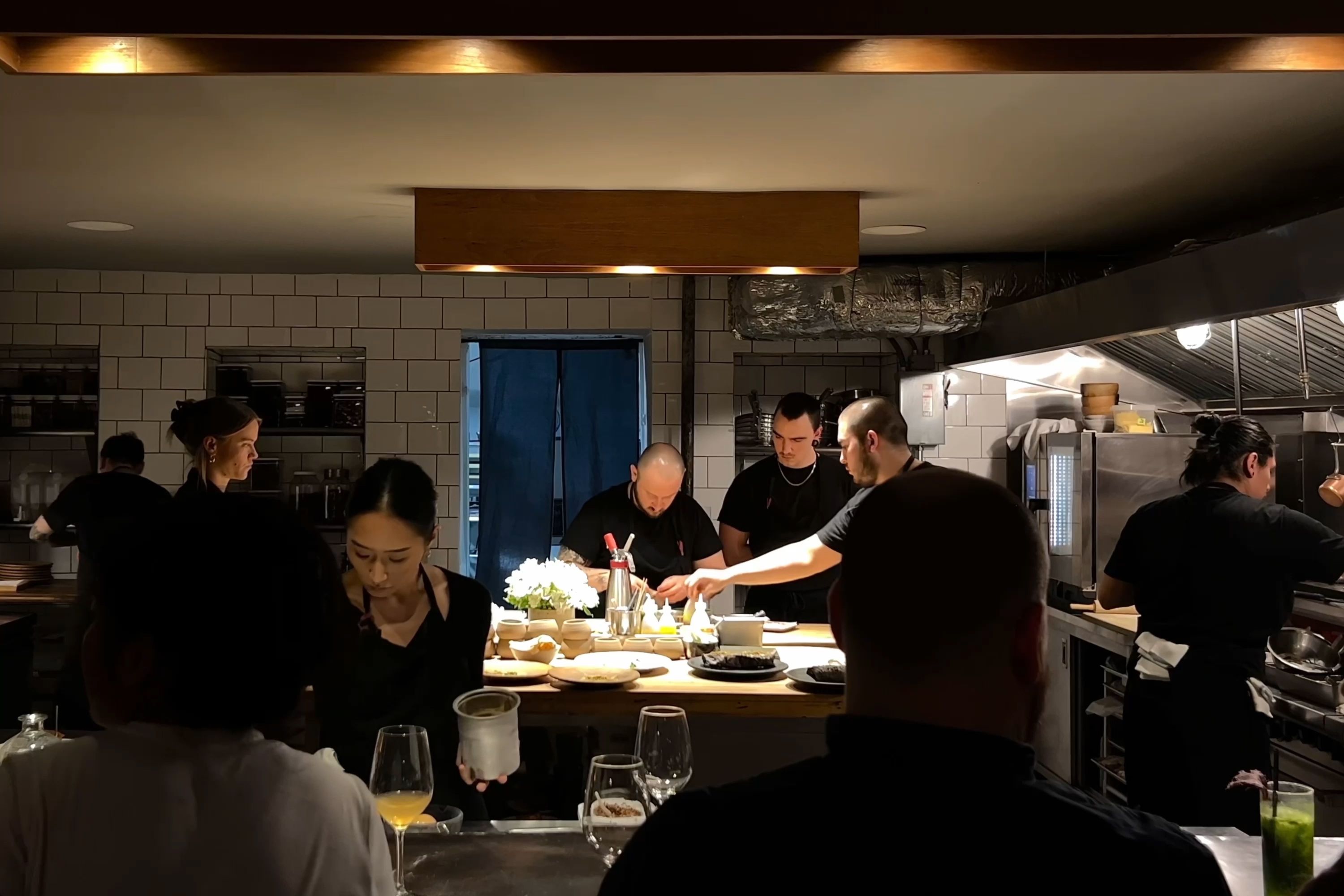when you want, where you want.
CJ Television
Corima Has Potential — and Excellent Tortillas
 Photo: Hugo Yu
Photo: Hugo YuI had always thought of chile con queso as a Texas dish until the first time I went to Chihuahua,” the Mexican-food expert Diana Kennedy once wrote. Many of the staples of American Mexican food — not to mention Tex-Mex — have their origins just over the border. Quesadillas, burritos: They come from the north, which makes sense, as northern Mexico is the land of wheat and the flour tortilla. But as Fidel Caballero, the El Paso–born, Chihuahua-raised chef and owner of the recently opened Corima, told Eater, “It’s not just about burritos, my friend.”
The restaurant, which began life as a series of pop-ups, is taking norteño cooking out of the quesadilla shops and planting its flag in fine dining. The space — long, deep, dark, a block west of Dimes Square’s hubbub — is split in two with a front-bar area for à la carte dining and a more secluded back room, in direct view of Caballero, his team, and an impressively flaming grill, for a two-hour, $98 tasting.
There is significant overlap among the two menus, and even opening cocktails have a tweak of the unexpected. Amid the city’s profusion of mezcal bars, Corima offers sotol, a Chihuahua spirit distilled from the desert shrub of the same name. In the Desert Rain, mixed with Cocchi Americano for a kind of alt-white Negroni, it had a milder profile and an intriguing freshness. “I’ve spent a lot of time in the desert,” our waitress opined, “and the Desert Rain has the taste of desert rain.”
Besides a cheese quesadilla with huitlacoche and, for extra mushroom funk, black truffle, there’s not much you’re likely to have encountered elsewhere. It’s no longer all that unusual to find insect garnishes, though you may need translation assistance to understand that the chicatanas dusting a tlayuda (an Oaxacan snack that’s like a distant cousin of the nacho) with beef cecina (salted and air-dried like a tender Mexican bresaola) are a smoky shower of ants.
Caballero cooked at Contra and at a three-star Michelin restaurant in Spain before opening Corima with his wife, Sofia Ostos. Chefiness pervades. Aycote beans come with a sour whey broth and a lacy kerchief of housemade headcheese. Straighter down the middle is a full raw-bar platter with spicy surf clam with leche de tigre, razor clams, oysters, and albacore — until you come to the roe-dotted jalapeño mince served on cobwebby sheets of Japanese gamtae.
For my tastes, Caballero’s interpretations of his home cuisine would have been more than enough, but Corima dabbles in japonaiserie so often, from the Tokyo-style décor of bare wooden tables and angular, uncomfortable benches and stools to regular-enough cameos of Japanese ingredients and techniques, that the restaurant could fairly be characterized as what we used to call “fusion.” Did I need uni — “three-quarters of an ounce,” the bartender confided — stirred into my $22 gin sour? Besides mild shock value and a faint, back-end hit of ocean salt, I’m not sure what it added. Edamame guacamole on the tlayuda. Potato udon (“wet fries,” I’d have to say) in the corn-husk dashi. Nixtamalized daikon. Chicharron furikake. Okay! Mexico’s northernmost states have historically seen plenty of outside influence — the carne asada that originated there came from Spanish settlers bringing cattle; Chihuahua cheese was originally made by local Mennonites — but the international interventions at Corima tend to distract as often as they add.
The real reason to go to Corima is its sourdough tortillas: warm, char-pocked, and cuddled into a bowl. My colleague Tammie Teclemariam rated them among the best flour tortillas in New York City and had the luck of watching one being made, stretched onto an inverted wok while its raw side was tanned with a blowtorch. Elastic and yeasty with a satisfying chew, it comes with a slick of recado-negro butter with the tannic, slightly coffeeish tang of red-eye gravy.
You could wrap hanks of it around any of the mains: a nearly black-skinned red snapper blinking up from its plate, tender carne asada in a chile jus, or my favorite, braised duck enmoladas, ready to be rescued from beneath an opaque bog of cotija foam. (“They’re experimenting with levels of wet,” one of my guests noted doubtfully.) You could just as soon take it straight. At $9, it’s a luxury tortilla. Even still, we finished ours and called for another. In the Tarahumara culture, indigenous to Chihuahua, corima means “circle of sharing,” but it was one circle I didn’t care to share.
All Rights Reserved. Copyright , Central Coast Communications, Inc.